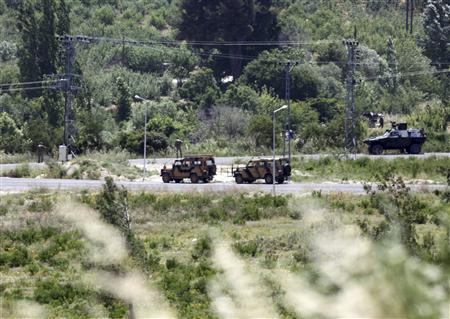Syria’s army broke a siege of Aleppo prison Thursday, cutting off a major rebel supply route, as Damascus allies China and Russia vetoed a bid to refer Syria to the International Criminal Court.
The Western-proposed UN Security Council resolution, which would have covered war crimes committed by both sides in the civil war, comes less than a fortnight before President Bashar al-Assad’s expected re-election.
Tanks and armoured vehicles rolled into the grounds of the prison in the main northern city of Aleppo, more than a year into a rebel siege of the sprawling complex, the Syrian Observatory for Human Rights said.
The development puts the army and its allies, including Lebanon’s Hezbollah, within reach of Castelo Road, which rebels in Aleppo have relied on as a supply route leading to a countryside rear base.
Aleppo province borders Turkey, a key supporter of Syria’s revolt and host to hundreds of thousands of refugees that have fled the three-year conflict.
“After a siege of nearly 13 months by Al-Nusra Front and Islamist rebels, regular armed forces backed by pro-regime fighters were able to break the siege of Aleppo central prison,” the Britain-based Observatory said.
The advance into the area around the prison was preceded by an aerial assault Thursday with highly destructive shrapnel-packed barrel bombs, it added.
Fighting in the area has killed at least 50 rebels and an unspecified number of regime forces since Tuesday, according to the group, which relies on sources on the ground for its reports.
Rebel fighters have repeatedly attacked the prison since April 2013, hoping to free the approximately 3,500 detainees inside, who are reportedly being held in dire conditions.
Troops inside the prison have fought to defend it.
In early February, a group of rebels launched a major assault on the prison and took control of the vast complex, before being partially driven back by air raids.
The prison had nearly 4,000 inmates before the siege, including Islamists. Poor humanitarian conditions, including a lack of food and medicines, and the bombardment have caused the death of some 600 prisoners, according to the Observatory.
Its capture comes on the heels of another significant victory for the regime, which this month reclaimed the Old City of Homs, Syria’s third city once dubbed the “capital of the revolution.”
The conflict flared when Assad’s opponents took up arms in response to a bloody crackdown on a popular uprising that erupted in March 2011. It is estimated to have claimed at least 162,000 lives and displaced nearly half the population.
Millions of people are in desperate need for humanitarian assistance.
Despite the war, the Damascus regime is to stage a presidential election on June 3 in the areas under its control.
The exiled opposition has dismissed the election as a “farce,” while the United States has branded it a “parody of democracy.”
Assad, running for a third seven-year term against two virtual unknowns, is expected to stroll to victory in the poll.
– Veto ‘callous political move’ –
Meanwhile, key Assad allies Russia and China vetoed a draft UN resolution that would have referred Syria to the International Criminal Court (ICC) to examine chemical attacks, systematic torture, barrel bombings and blocked aid access.
This was the fourth time both countries have blocked Western resolutions relating to the conflict.
The 13 other members of the Security Council all voted in favour of the proposed resolution, which would have seen crimes committed by all sides in the country’s war examined.
US Ambassador Samantha Power told the council that, as a result of the vetoes, “the Syrian people will not see justice today.”
Amnesty International reacted by saying the vetoes are a “callous political move that betrays suffering people in Syria.”
Syria is not a signatory to the International Criminal Court so only the Security Council can decide whether to refer war crimes or crimes against humanity on its territory to the court.
It did the same for Darfur in 2005 and Libya in 2011.










